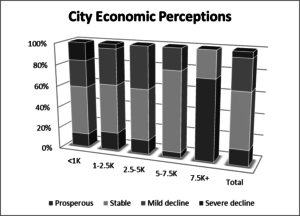The report documenting results of the Texas Rural Leaders and Economies Survey is now posted on the Rural Communities website. A few economic highlights are below. For more information view the complete report online. Future posts will discuss local institutions, keeping young people, and rural leadership.
Leaders tended to view overall economic conditions and retail conditions similarly. Most respondents rated their economies and retail sectors as stable. Perceptions of decline across both city and county respondents were more evident in rural counties not adjacent to urban areas.
More than half of respondents thought a stronger local economy was an outcome of regional cooperation, but only 39% thought cooperation would result in broad-based development in the region.
Almost half of rural leaders said their jurisdiction did not have a formal economic development plan. Business retention and expansion, industry attraction, and entrepreneurship development were common development strategies.
Recent research has stressed that rural is not synonymous with agriculture. However, in rural Texas the agriculture is closely linked to the rural economy. Many respondents noted that agriculture is one of the top three industries in their economy, followed by energy (most often oil and gas but also wind). Manufacturing is also important in many economies.
(most often oil and gas but also wind). Manufacturing is also important in many economies.
For these results and more, visit:
http://agecoext.tamu.edu/files/2013/08/2016-Texas-Rural-Leaders-and-Economies-Survey-Summary.pdf
